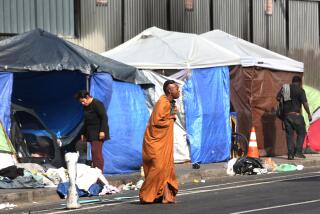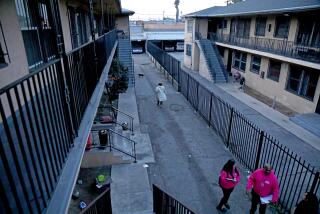Newsom orders delay on evictions over coronavirus, while L.A. votes down a blanket ban

With April 1 fast approaching, Gov. Gavin Newsom and the L.A. City Council on Friday expanded efforts to prevent residential evictions during the coronavirus pandemic. But the governor and councilmembers dismissed calls for broader action that housing advocates say would have better protected tenants from losing their homes.
Through an executive order, Newsom announced a two-month delay on residential evictions for those who canât pay their rent as a result of the virus â the first statewide action he has taken on evictions during the outbreak. But the order still allows renters to be removed from their apartments come June.
In Los Angeles, the City Council voted to prevent landlords from evicting tenants affected by the coronavirus, including those who have had to move in with family members and crowd apartments beyond what would be normally allowed under their leases. The council, however, fell short of enacting a complete ban on evictions by one vote.
The governorâs order covers those who have lost work because of the coronavirus and those who need to take care of children whose schools are closed or family members with COVID-19. Renters will eventually have to make up all the rent they owe.
âFor tenants, there will be no eviction proceedings; there will be no enforcement as it relates to pay for COVID-19,â Newsom said at a news conference in Los Angeles.
But Newsomâs order doesnât prevent the legal process of being evicted from ultimately occurring and still requires renters affected by the coronavirus to jump through a number of hoops to qualify for the two-month delay. For instance, tenants must notify their landlords in writing within seven days of nonpayment, and a landlord could still file a case against a tenant for their removal.
Even if a renter is able to convince a judge that theyâre covered under the governorâs order, their landlord could order them out of the property on June 1 for failing to pay rent in April, said Silvana Naguib, who handles eviction cases as a supervising staff attorney at Public Counsel.
âYou still didnât pay your rent and youâre still at fault and you can still be evicted,â Naguib said.
Naguib and others said the governorâs order could prove to be counterproductive, leading renters to believe they have greater protections against being evicted than they actually do under the law.
âI think weâre deeply disappointed that it isnât just a blanket moratorium on evictions,â said Francisco DueĂąas, executive director of Housing Now, an advocacy group that has led a push for Newsom to issue more robust protections. âBesides the many different requirements that tenants have to come up with to qualify, thereâs just general confusion about what the governor did.â
Newsomâs order still allows for local governments to pass their own stricter eviction bans, something that has happened already in Los Angeles, San Francisco, San Jose and a few dozen other cities and counties across the state.
Days before Fridayâs council debate in Los Angeles, Mayor Eric Garcetti issued orders temporarily blocking evictions for those affected by the coronavirus and in situations where apartment owners are planning to pull rentals off the market.
Following a discussion that lasted more than two hours, the council expanded on Garcettiâs actions by adding a provision barring landlords from evicting renters for moving in with family members because of the virus â not just because they canât pay rent. The council also voted to give tenants a year to repay their landlords before facing an eviction, instead of just six months, and waived late fees for nonpayment. But the plan still requires tenants to prove their defense against an eviction in court.
That troubled Councilman Mike Bonin, who represents Venice and several other Westside neighborhoods. He pushed for a complete ban on all evictions during the pandemic so that renters wouldnât face the threat of a court challenge while trying to recover.
âThe best thing to do in a circumstance like this, in an emergency, is to do something simple,â Bonin told his colleagues during debate. âYou can always revise this later. The simplest thing is to have a moratorium in effect, so people do not wind up out on the street.â
But such an expansive eviction ban worried other council members, who were uneasy about landlords being unable to toss out tenants involved in illegal activity and about the effect on smaller landlords who need their tenantsâ rent to pay their own bills.
âI think itâs concerning to leave it so broad,â said Councilwoman Monica Rodriguez, who represents northeast San Fernando Valley communities. âI think we just lend ourselves for the potential of the foreclosures that may come from this.â
Boninâs effort for a complete eviction ban failed by one vote.
Advocates for renters in L.A. and elsewhere say that even a strong prohibition against evictions would not provide enough assistance. Workers, particularly those in low-wage service and restaurant industries, have been off the job for more than a week as local governments and, ultimately, the state ordered businesses to close and people to stay at home to prevent the spread of the virus. More than 1 million Californians applied for unemployment benefits over the course of just 12 days through Wednesday, the governor said.
Besides an eviction moratorium, the housing activists argue that L.A. should halt rent increases, waive late fees and develop a program ordering landlords to forgive rents.
âThe city has the ability to protect all of its residents in this time of great uncertainty and ensure that all residents who currently have homes can stay in them,â wrote a group of 200 labor, community and housing groups to the City Council Friday.
Earlier in the week, Newsom announced mortgage assistance for homeowners. Eligible homeowners will be able to defer payments for at least three months and perhaps longer if they suffer hardship from the pandemic. Late payments will not be reported to credit agencies. Four of the nationâs largest banks â Wells Fargo, U.S. Bank, Citibank and JPMorgan Chase â as well as 200 state-chartered banks and credit unions have agreed to the mortgage deferrals.
This means that, so far, homeowners across the state have received greater financial relief than renters, who have disproportionately lower income.
Nevertheless, many landlords are acting on their own. The California Apartment Assn., the stateâs largest landlord group, has asked its members to stop rent increases and evictions, waive late fees and work out payment plans for affected tenants.
Debra Carlton, a senior vice president with the association, said the governorâs action on Friday was reasonable and maintains a balance between supporting the needs of renters and understanding that landlords also face financial challenges in paying their mortgages, taxes and other bills.
âWe appreciate the fact that heâs continuing to try to thread the needle when balancing out what owners and tenants are facing,â Carlton said. âEveryoneâs somewhat in a state of panic.â
Times staff writers Ruben Vives and Phil Willon contributed to this report.
More to Read
Sign up for Essential California
The most important California stories and recommendations in your inbox every morning.
You may occasionally receive promotional content from the Los Angeles Times.





![[20060326 (LA/A20) -- STATING THE CASE: Marchers organized by unions, religious organizations and immigrants rights groups carry signs and chant in downtown L.A. "People are really upset that all the work they do, everything that they give to this nation, is ignored," said Angelica Salas of the Coalition of Humane Immigrant Rights. -- PHOTOGRAPHER: Photographs by Gina Ferazzi The Los Angeles Times] *** [Ferazzi, Gina -- - 109170.ME.0325.rights.12.GMF- Gina Ferazzi/Los Angeles Times - Thousands of protesters march to city hall in downtown Los Angeles Saturday, March 25, 2006. They are protesting against House-passed HR 4437, an anti-immigration bill that opponents say will criminalize millions of immigrant families and anyone who comes into contact with them.]](https://ca-times.brightspotcdn.com/dims4/default/34f403d/2147483647/strip/true/crop/1983x1322+109+0/resize/840x560!/quality/75/?url=https%3A%2F%2Fcalifornia-times-brightspot.s3.amazonaws.com%2Fzbk%2Fdamlat_images%2FLA%2FLA_PHOTO_ARCHIVE%2FSDOCS%2854%29%2Fkx3lslnc.JPG)


